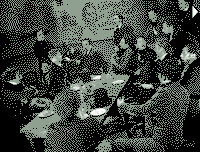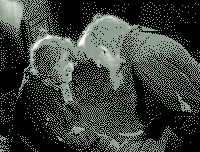August 12, 2008
Civil discontent growing over alleged PNG corruption
A Papua New Guinea corruption watchdog has warned that civil discontent over alleged government corruption is growing.
The group say there could be a violent public backlash because of the ever increasing number of corrupt dealings in the Government.
Transparency International’s PNG boss Mike Manning says the breakdown of law and order is getting worse.
“We don’t have any answers immediately as to how we fix a single part of the breakdown of the system of law and order and the breakdown of the systems which would control corruption,” he said.
“But we do know that we’re reading about them day after day after day and that they’re getting worse.”
Transparency International PNG has also criticised government agencies like the Ombudsman Commission for not following through with investigations into leadership issues.
Failed State definition:
A state could be said to “succeed” if it maintains, a monopoly on the legitimate use of physical force within its borders. When this is broken (e.g., through the dominant presence of warlords, militias, or terrorism), the very existence of the state becomes dubious, and the state becomes a failed state.
August 7, 2008
Nicaraguan lobster divers risk lives
Nicaragua is one of the last places where commercial lobster diving is allowed despite tragic results.
PUERTO CABEZAS, Nicaragua — Milton Periera sits in a wooden wheelchair fitted with hand pedals, watching the lobster boats appear on the gray horizon.
They are bringing the first lobster harvest in since last year’s Category 5 Hurricane Felix plowed through this impoverished port town on Nicaragua’s Caribbean coast.
Periera used to plunge as deep as 140 feet, up to 15 times, for lobster, all of which ended up on the plates of Americans. During season, he earned up to $200 a day snatching lobster from the seabed, making a small fortune in one of the poorest parts of the world.
After one particularly deep dive, he felt a squeezing in his chest. Decompression sickness overtook him, and his legs went numb.
”Maybe I’ll walk again, but who knows when that will be,” says the 26-year-old paraplegic.
As many as 5,000 Nicaraguan men — most of them indigenous Miskitos — risk their lives each year in Nicaragua’s commercial lobster industry, taking on the increasingly perilous task of plucking ”red gold” from the Caribbean. Amid widespread overexploitation, divers are heading farther out into the high seas, and diving deeper to bring in the harvest.
According to the local divers’ union, there are as many as 800 debilitated or paralyzed divers living in Nicaragua, and the death toll of those who suffered health complications related to decompression sickness has reached 200 since 1990. Though the Nicaraguan government plans to phase out lobster diving within three years, it’s one of the last places on Earth where commercial lobster diving is allowed despite such tragic results.
`ENDEMIC DISEASE’
Chuck Carr, a marine biologist from the Gainesville-based Wildlife Conservation Society, who specializes in Central America, said decompression sickness is an ”endemic disease” on the Mosquito coast.
”It’s abuse of natural resources, of human beings. It’s a scandal,” said Carr. “Nicaragua is notorious for this syndrome of diving without regard for dive tables, to the extent that people get bends on a mass basis. Nobody has ever seen anything like it.”
As Nicaragua’s economically devastated North Atlantic Autonomous Region (RAAN) tries to recover from the disastrous effects of Felix, more divers are expected to head out to sea this year to earn desperately needed cash.
”The only income that comes into this town is through the buzos [divers],” said Dr. Francisco Selvas, who treats divers with the bends at the Nuevo Amanacer hospital in Puerto Cabezas, home to Nicaragua’s only decompression chamber.
The Nicaraguan Fishing Institute’s solution is to lure lobster divers into the fishing industry. The Nicaraguan Congress just approved $17 million in World Bank financing that includes funds for small fishermen recovering from the hurricane, says the institute’s director, Steadman Fagoth. When it swept through last September, Felix wreaked havoc on Nicaragua’s fish export industry, which dropped 11 percent to $90 million last year, according to the Central Bank.
”It is more profitable and they can be more independent,” Fagoth said of the divers, adding that the country’s maritime territory — expanded last year in a territorial dispute settlement suit with Honduras — houses 6,000 metric tons and 57 species of exportable fish, a largely untapped resource.
ASKING FOR TROUBLE
But lobster industry insiders like lobster exporter Fabio Robelo say cutting off the main source of income would be asking for trouble. On several occasions throughout the Caribbean, violent riots have broken out in the wake of the hurricane.
On Corn Islands, the pair of Caribbean islands where Robelo is manager for Central American Fisheries, lobster divers took over the airport and tried burning down the mayor’s office in June protests against diminishing earnings as lobster companies cut pay due to skyrocketing gas prices.
”How can you tell so many people not to lobster dive without offering them something else?” asked Robelo.
The notoriously isolated Puerto Cabezas, a town of 40,000 that is a bumpy two-day drive from Managua, saw a population explosion after the 1980s contra war came to an end. Miskito Indians returning from exile or retiring their arms became the region’s first lobster divers as scuba technology became available in Central America, Carr said. Because diving is three times more effective than traps, the coasts’ shallow lobster grounds were depleted within a few years. Divers headed into the deep blue.
Today, lobster companies are going 30 miles out to sea and diving more than 100 feet. Hondurans who have killed off lobster in their area of the Caribbean by overfishing it head now to Nicaragua. Few follow dive tables. In Puerto Cabezas, where nearly half the population lived in extreme poverty before Felix hit, there are few other employment opportunities.
Carr, who specializes in Central America’s Caribbean, says the lobster boat owners follow no safety standards.
”Another nasty part of this story is that the captain will turn their back when that kid agrees to dive for the fourth time before diving without decompressing,” he said. “It’s just outrageous.”
The Caribbean drug culture adds to the chaotic equation. Divers come back to shore and spend their cash on booze and cocaine.
”Families don’t get the rewards,” Carr said.
Robelo, who oversees one of the Caribbean’s biggest lobster operations, says the lobster supply is being bled by a $14 million annual black market for fish and lobster in Nicaragua. Not only is the April-to-June lobster ban largely ignored by small divers, but so is a prohibition on hunting immature lobster before they spawn.
Before Felix swept through, the government had canceled lobster permits due to scarcities caused by overexploitation.
The hurricane made the shortage worse.
”Felix destroyed the reef and seabed. Nature needs time to regenerate itself,” said Brooklyn Rivera, Nicaragua’s only indigenous legislator representing the RAAN.
VETS WITHOUT MEDALS
At the dock entrance in Puerto Cabezas, old leather-faced divers with walking canes and wheelchairs loiter among crowds of women and children, looking like war vets without all the medals.
Like many of the growing number of divers who suffer the bends — an illness with a range of symptoms caused by a pressure decrease involved with a rapid ascent from a dive — Periera didn’t get immediate treatment when decompression sickness set in.
The lobster companies are reluctant to take on costs of evacuating ill divers. If at high sea, the trip back can take two weeks, Selva said.
”They’re not going to take a loss to help a diver,” he said.
August 6, 2008
Raskol gangs rule world’s worst city
High levels of rape, robbery and murder help keep Port Moresby, the capital of Papua New Guinea, at the wrong end of the hardship table.
In Lagos, expect chaos. There are gun battles in Bogotá. Crime has been a curse in Karachi. But there is nowhere on earth quite like this.
According to a survey by the Economist Intelligence Unit, the capital of Papua New Guinea has beaten all-comers – again – to take a title that no city on earth would covet.
With poverty, crime, poor healthcare and a rampant gang culture, Port Moresby consistently scores highest in the unit’s “hardship” table, meaning it is regarded as the worst place to live among 130 world capitals. Baghdad is not on the list.
According to the unit, most aspects of daily life in Moresby are problematic.
Little bigger than Plymouth, with a population of 250,000, it is a place where murder rates are exceptionally high, thanks mainly to the “raskol” gangs that control large areas of the city.
Tales of their exploits are legion; from bank robberies with M-16 machine guns, to car holdups by mobs armed with machetes.
Rape cases are even worse: in one widely reported incident last year, an injured nurse was dragged away from a car crash to be gang-raped.
Visitors to Port Moresby are advised not to go out after sunset, and to avoid walking the streets in most areas even during the day.
The houses of the wealthy squat behind walls tipped with razor-wire and gates watched by security guards.
The precautions are necessary because a survey of international crime by the Home Office shows that the murder rate there is three times that of Moscow, and 23 times that of London.
The rates for robberies and rapes are just as dire.
But the raskols say much of the violence is meted out by the police, and that they are provoked into retaliation.
The base of Moresby’s Bomai gang can be found up a dark sidestreet in the suburb of Four Mile. At the entrance to their squatter settlement a man is on guard, armed with a walkie-talkie.
“The police we know are very dangerous. They come in to the settlement and raid the people’s food and property and beers,” says Koiva, one of the leaders of the gang.
He has a pattern of welts on his head where he says he was beaten by a police officer with a glass bottle to extract a confession.
Another gang member, Stephen, shows two dark scars on his legs which he says were caused when he was shot in police custody.
Most people living in Port Moresby show little sympathy for the Bomai, whose raids on businesses and residential compounds have made them infamous. “Bloody raskols. Shoot first and ask questions later, that’s what they [the police] should do,” says an Australian expatriate.
Often, that is precisely what happens.
“I think the government are happy every time the police shoot a young man but we have thousands more youths on the streets,” says Peter Gola, a former raskol working at City Mission, a charity that helps the city’s street children.
Most raskols argue that their crimes are driven by the crushing poverty of life.
“We never mean to kill people,” says Koiva. “We’re just trying to scare them and get what we want to get.”
Papua New Guinea has no welfare state, so in rural areas family and clan networks have kept people in food and lodging. That system has broken down in the capital, which sits in an arid part of the country where unemployment rates are estimated to be between 60- and 90%.
A kilo of rice here costs four kina – about 70p – and a tin of fish is three kina, but this is beyond the means of many families.
Most raskols say they get into crime when their parents send them out to make money. Pressured to generate an income, they turn to violence. An armed robbery can easily net more than 100,000 kina (£17,500).
“When that happens, we live like kings,” says Harris, another Bomai member. “If you’re lucky, you eat something good. Maybe chicken.”
But there is some hope for change. Twenty minutes’ drive from Moresby, City Mission’s New Life farm has offered an alternative to the violence for between 5,000 and 6,000 street children since it opened 11 years ago.
The regime is strict: smoking and drinking are forbidden and there is a strong religious flavour to the instruction.
But the founder, Larry George, says the structure and respect of their new lives can work wonders.
“Most of them aren’t bad kids,” says Mr George. “It’s mainly just poverty that’s driving the crime. People can read in the papers about the government stealing millions of kina and get really frustrated.”
Many of the children, he says, end up as security guards, exchanging fire with the raskols who were once their peers.
Global ranking
Best five
1= Melbourne, Australia
1= Vancouver, Canada
1= Vienna, Austria
4 Perth, Australia
5 Geneva, Switzerland
Worst five
126 Phnom Penh, Cambodia
127 Lagos, Nigeria
128 Dhaka, Bangladesh
129 Karachi, Pakistan
130 Port Moresby, Papua New Guinea
Chinese cops slaughtered
Try as it might, Beijing can’t control everything
This country, after trying to anticipate and stop every possible security situation leading into the Summer Olympics, has found with deadly certainty that the Games will only magnify discontent and anger.
In the western border city of Kashgar, 4,000 km from this host city, militants have attacked and killed a battalion of police officers.
The terrorists, lashing out in a volatile region, struck with unprecedented brutality, murdering at least 16 officers and wounding as many again.
It happened just as the world’s attention is on China. Which is part of the point.
As well as bloody, the attack on the officers — on a morning jog through the city — was symbolic, because it took place in an area of China under constant watch.
Officials here claim to have put down several planned attacks, orchestrated around the Games, which begin here on Aug. 8.
They have said separtists from the East Turkestan Islamic Movement have planned a number of assaults.
The police killings in Kashgar yesterday — which involved homemade bombs and knives, local media reports say — were just what Beijing has hoped to avoid, as clocks here in the capital count down the days, minutes and seconds until the start of the Olympics.
Security is everywhere, as face recognition software blueprints your features when you use your Olympic credentials to get into secure locations.
The police presence is especially tight around Tiananmen Square, where the world watched Chinese troops march against pro-democracy protesters almost 20 years ago. But on the same day the terrorists killed the police officers here, a small band of Beijing residents still managed to use a corner of the huge square to be heard.
At least for a moment.
One of the main social issues here in the capital has been the land scooped up, cleared out and rebuilt on.
Charging their homes have been stolen for the sake of progress — in this case, not for the Olympics, but for urban development — a small band of angry residents tried to protest in the square yesterday. Waving banners and attracting some media attention, as well as police officers, the group said they were proud of hosting the Olympics, but upset with how ordinary homeowners are being treated as China welcomes the world.
August 2, 2008
Universal Declaration of Human Rights
PREAMBLE
Whereas recognition of the inherent dignity and of the equal and inalienable rights of all members of the human family is the foundation of freedom, justice and peace in the world,
Whereas disregard and contempt for human rights have resulted in barbarous acts which have outraged the conscience of mankind, and the advent of a world in which human beings shall enjoy freedom of speech and belief and freedom from fear and want has been proclaimed as the highest aspiration of the common people,
Whereas it is essential, if man is not to be compelled to have recourse, as a last resort, to rebellion against tyranny and oppression, that human rights should be protected by the rule of law,
Whereas it is essential to promote the development of friendly relations between nations,
Whereas the peoples of the United Nations have in the Charter reaffirmed their faith in fundamental human rights, in the dignity and worth of the human person and in the equal rights of men and women and have determined to promote social progress and better standards of life in larger freedom,
Whereas Member States have pledged themselves to achieve, in co-operation with the United Nations, the promotion of universal respect for and observance of human rights and fundamental freedoms,
Whereas a common understanding of these rights and freedoms is of the greatest importance for the full realization of this pledge,
Now, Therefore THE GENERAL ASSEMBLY proclaims THIS UNIVERSAL DECLARATION OF HUMAN RIGHTS as a common standard of achievement for all peoples and all nations, to the end that every individual and every organ of society, keeping this Declaration constantly in mind, shall strive by teaching and education to promote respect for these rights and freedoms and by progressive measures, national and international, to secure their universal and effective recognition and observance, both among the peoples of Member States themselves and among the peoples of territories under their jurisdiction.
Article 1.
All human beings are born free and equal in dignity and rights.They are endowed with reason and conscience and should act towards one another in a spirit of brotherhood.
Article 2.
Everyone is entitled to all the rights and freedoms set forth in this Declaration, without distinction of any kind, such as race, colour, sex, language, religion, political or other opinion, national or social origin, property, birth or other status. Furthermore, no distinction shall be made on the basis of the political, jurisdictional or international status of the country or territory to which a person belongs, whether it be independent, trust, non-self-governing or under any other limitation of sovereignty.
Article 3.
Everyone has the right to life, liberty and security of person.
Article 4.
No one shall be held in slavery or servitude; slavery and the slave trade shall be prohibited in all their forms.
Article 5.
No one shall be subjected to torture or to cruel, inhuman or degrading treatment or punishment.
Article 6.
Everyone has the right to recognition everywhere as a person before the law.
Article 7.
All are equal before the law and are entitled without any discrimination to equal protection of the law. All are entitled to equal protection against any discrimination in violation of this Declaration and against any incitement to such discrimination.
Article 8.
Everyone has the right to an effective remedy by the competent national tribunals for acts violating the fundamental rights granted him by the constitution or by law.
Article 9.
No one shall be subjected to arbitrary arrest, detention or exile.
Article 10.
Everyone is entitled in full equality to a fair and public hearing by an independent and impartial tribunal, in the determination of his rights and obligations and of any criminal charge against him.
Article 11.
(1) Everyone charged with a penal offence has the right to be presumed innocent until proved guilty according to law in a public trial at which he has had all the guarantees necessary for his defence.
(2) No one shall be held guilty of any penal offence on account of any act or omission which did not constitute a penal offence, under national or international law, at the time when it was committed. Nor shall a heavier penalty be imposed than the one that was applicable at the time the penal offence was committed.
Article 12.
No one shall be subjected to arbitrary interference with his privacy, family, home or correspondence, nor to attacks upon his honour and reputation. Everyone has the right to the protection of the law against such interference or attacks.
Article 13.
(1) Everyone has the right to freedom of movement and residence within the borders of each state.
(2) Everyone has the right to leave any country, including his own, and to return to his country.
Article 14.
(1) Everyone has the right to seek and to enjoy in other countries asylum from persecution.
(2) This right may not be invoked in the case of prosecutions genuinely arising from non-political crimes or from acts contrary to the purposes and principles of the United Nations.
Article 15.
(1) Everyone has the right to a nationality.
(2) No one shall be arbitrarily deprived of his nationality nor denied the right to change his nationality.
Article 16.
(1) Men and women of full age, without any limitation due to race, nationality or religion, have the right to marry and to found a family. They are entitled to equal rights as to marriage, during marriage and at its dissolution.
(2) Marriage shall be entered into only with the free and full consent of the intending spouses.
(3) The family is the natural and fundamental group unit of society and is entitled to protection by society and the State.
Article 17.
(1) Everyone has the right to own property alone as well as in association with others.
(2) No one shall be arbitrarily deprived of his property.
Article 18.
Everyone has the right to freedom of thought, conscience and religion; this right includes freedom to change his religion or belief, and freedom, either alone or in community with others and in public or private, to manifest his religion or belief in teaching, practice, worship and observance.
Article 19.
Everyone has the right to freedom of opinion and expression; this right includes freedom to hold opinions without interference and to seek, receive and impart information and ideas through any media and regardless of frontiers.
Article 20.
(1) Everyone has the right to freedom of peaceful assembly and association.
(2) No one may be compelled to belong to an association.
Article 21.
(1) Everyone has the right to take part in the government of his country, directly or through freely chosen representatives.
(2) Everyone has the right of equal access to public service in his country.
(3) The will of the people shall be the basis of the authority of government; this will shall be expressed in periodic and genuine elections which shall be by universal and equal suffrage and shall be held by secret vote or by equivalent free voting procedures.
Article 22.
Everyone, as a member of society, has the right to social security and is entitled to realization, through national effort and international co-operation and in accordance with the organization and resources of each State, of the economic, social and cultural rights indispensable for his dignity and the free development of his personality.
Article 23.
(1) Everyone has the right to work, to free choice of employment, to just and favourable conditions of work and to protection against unemployment.
(2) Everyone, without any discrimination, has the right to equal pay for equal work.
(3) Everyone who works has the right to just and favourable remuneration ensuring for himself and his family an existence worthy of human dignity, and supplemented, if necessary, by other means of social protection.
(4) Everyone has the right to form and to join trade unions for the protection of his interests.
Article 24.
Everyone has the right to rest and leisure, including reasonable limitation of working hours and periodic holidays with pay.
Article 25.
(1) Everyone has the right to a standard of living adequate for the health and well-being of himself and of his family, including food, clothing, housing and medical care and necessary social services, and the right to security in the event of unemployment, sickness, disability, widowhood, old age or other lack of livelihood in circumstances beyond his control.
(2) Motherhood and childhood are entitled to special care and assistance. All children, whether born in or out of wedlock, shall enjoy the same social protection.
Article 26.
(1) Everyone has the right to education. Education shall be free, at least in the elementary and fundamental stages. Elementary education shall be compulsory. Technical and professional education shall be made generally available and higher education shall be equally accessible to all on the basis of merit.
(2) Education shall be directed to the full development of the human personality and to the strengthening of respect for human rights and fundamental freedoms. It shall promote understanding, tolerance and friendship among all nations, racial or religious groups, and shall further the activities of the United Nations for the maintenance of peace.
(3) Parents have a prior right to choose the kind of education that shall be given to their children.
Article 27.
(1) Everyone has the right freely to participate in the cultural life of the community, to enjoy the arts and to share in scientific advancement and its benefits.
(2) Everyone has the right to the protection of the moral and material interests resulting from any scientific, literary or artistic production of which he is the author.
Article 28.
Everyone is entitled to a social and international order in which the rights and freedoms set forth in this Declaration can be fully realized.
Article 29.
(1) Everyone has duties to the community in which alone the free and full development of his personality is possible.
(2) In the exercise of his rights and freedoms, everyone shall be subject only to such limitations as are determined by law solely for the purpose of securing due recognition and respect for the rights and freedoms of others and of meeting the just requirements of morality, public order and the general welfare in a democratic society.
(3) These rights and freedoms may in no case be exercised contrary to the purposes and principles of the United Nations.
Article 30.
Nothing in this Declaration may be interpreted as implying for any State, group or person any right to engage in any activity or to perform any act aimed at the destruction of any of the rights and freedoms set forth herein.















